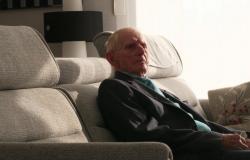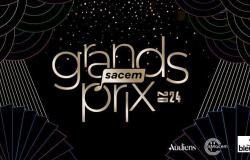
Jennifer Devoldère, you like to stage characters in environments in which we would not imagine them at first glance, like this student in ''Sage homme'' or this student who stutters in a theater troupe. Where does this desire come from?
Jennifer Devoldère: I didn't perceive this as a recurrence. It's true that my characters often find themselves the opposite of what one might expect of them in their world. For example, a man in a feminine universe or a character who will declaim tirades on stage despite a handicap… I think it's unconscious. I like exploring characters who are out of step, because it pushes them to move forward, to evolve in a world where they don't seem to have their place.
Aure Atika, this question of stuttering is central in ''Le Panache''. Did you meet any specialists in this subject to play Colin's mother?
Marry Atika: No, not particularly. I spoke a lot with Joachim Arseguel [qui interprète Colin dans le film, ndlr]who is truly a stutterer, and with Jennifer. This led me to question myself as a mother about how we manage a child who stutters: do we ask open or closed questions? Are we trying to avoid situations that could expose it? At certain times, are we tempted to understand each other half-heartedly to get around words that are difficult to pronounce? This also influences the game. At times, Joachim would take a few seconds to say a word, and this would pause time, changing the rhythm of the scene. It's a challenge, but it adds a valuable authenticity to the film. I had to deal with these silences and integrate this aspect into my mothering game.
JD: We often think that stuttering is a disability that can be cured, but it's not that simple. In most cases, it is not linked to a psychological cause. The disorder is more of a neurological nature. Some can learn to control it, but it is a long-term accompaniment and although it may lessen over the years, it does not completely disappear. For people who suffer from it, it is a real journey.
Theater helps, here, to regain self-confidence…
JD: The film is adapted from the play ''In the Skin of Cyrano'', which was a real success. She talks about self-acceptance, one's difference and the quest for identity. When I discovered it, these themes spoke to me. However, I had not thought about stuttering in particular before seeing this work where disability takes on a universal symbolic dimension. We have all experienced moments when we stumble over words, where we cannot express our thoughts. The film touches on something deeply human.
Do you think that theater or cinema can be a real therapy for certain actors or actresses?
A. A.: Absolutely, theater can help overcome shyness. Afterwards, for stuttering, I don't know, but it's true that it offers a space to express one's fragility, to reveal oneself. Even if you compose a character, acting also means agreeing to show a part of yourself. It is a liberating exercise, even if everything depends on the context and the supervision.
Through your character, the film also addresses the place of belief and religion, since this mother enrolls her child in a private Catholic school.
A. A.: Yes, but not for religious reasons. This woman is above all looking for a framework that will protect her son from school harassment, which he has already suffered elsewhere. She thinks that a private school, with its values, could be more vigilant and caring… However, the film also shows the limits of this idea.
''Le Panache'' takes a critical look at the functioning of its schools, with strict, rigid rules, with the teacher played by José Garcia who hits a wall when he tries another approach, freer, more artistic…
JD: I wouldn't say that's a criticism. Education is a complex subject, and private schools, like Catholic schools, are part of the educational landscape in France. They have qualities and faults. In the film, it is simply shown that in these establishments, parents often have an extremely strong influence, which can create tensions. For my part, I hope that things can evolve but, even if it means repeating myself, I did not want to make a direct criticism. This is a context that applies to other types of schools as well. Every institution has its rules and its resistance to change. Nothing is completely black or white.
Our circus
History
Colin (Joachim Arseguel), 14, enters a new school and he's freaking out: how do you get through it when, like him, you're a stutterer? His meeting with Mr. Devarseau (José Garcia), a charismatic French teacher, will push him to face his fears and come out of his isolation. Now, Colin has a group of friends and a project: to go on stage to play Cyrano in front of the whole school…
Our opinion
Adapted from a successful play, “Le Panache” does not suffer from filmed theater syndrome… which does not make it perfect. Behind the camera, Jennifer Devoldère strives to show this teenager's fight to overcome his handicap and does not neglect to show the point of view of those around him, from his distraught mother, played by Aure Atika, to his classmates who will learn to accept him as he is.
A lovely story told in a very wise, televisual way, without taking any risks. The message of tolerance is supported to the point that the film gets bogged down in didactics, as was already the case for “Wise Man”, the director's previous film…
However, we praise the performance of young Joachim Arseguel – himself a stutterer – and of José Garcia as a teacher who tries to make things happen within a private Catholic school, with far too rigid practices. An interesting clash between the old and the new world, but which again needed to be further developed to give more panache to this “Panache” which is sometimes hesitant and therefore far from the “Circle of disappeared poets”, of which we sometimes feel the influence, much too heavy.
> De Jennifer Devoldère (France). With Joachim Arseguel, José Garcia, Aure Atika… Dramatic comedy. 1 h 33.
(Photo SND Vertigo Productions)





